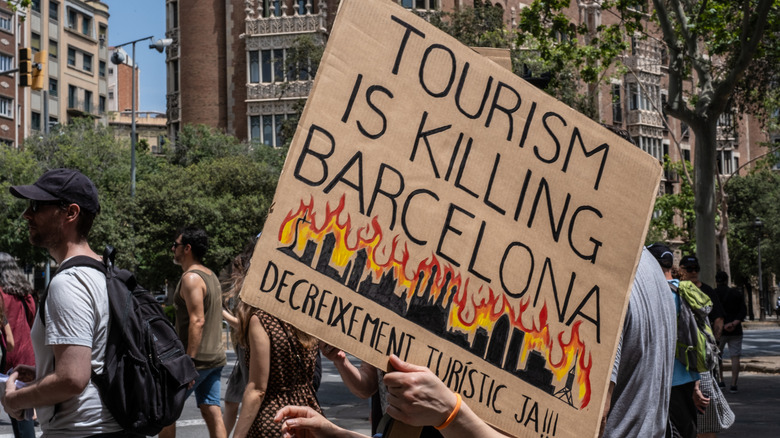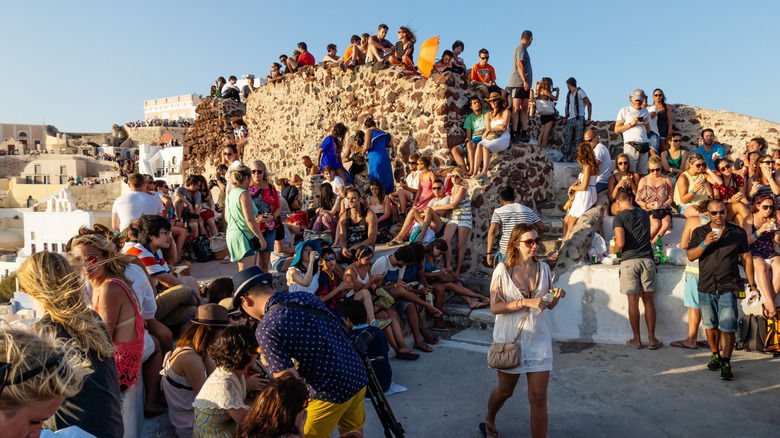Rick Steves Explains Why Europeans Have Become Anti-Tourist (And How To Help Reverse The Trend)
You've probably heard about anti-tourist protests in places like Barcelona, Spain. Many cities have curtailed or banned large cruise ships, such as Cannes, France, and daytripper fees in Venice, Italy, doubled in 2025. Perhaps you've wondered if your trip to Rome is going to look different after fines were instituted for people sitting on the Spanish Steps, or following the news that visitors have been leaving graffiti on the Colosseum. It's no secret that many Europeans have become anti-tourist in recent years, and it might leave you reconsidering your travel plans. Luckily, travel pro Rick Steves has not only information on why, but also ways to help reverse the trend.
On his website, Steves says, "Our appetite for bucket-list, crowdsourced, Instagrammable travels is funneling countless tourists into the same few places. Consequently, popular cities are feeling crushed by mass tourism, and popular sights are congested to the point where many find them not only less enjoyable... but actually dangerous." We're all crowding the same places to get the same shots as the people we follow online. The drive to make our lives look fascinating on social media has changed tourism, and if that hits a little too close to home, you might want to rethink how you view travel.
The anti-tourism trend, explained by Rick Steves
One of the big issues for some popular tourist spots is that people are just popping in for the day. Rick Steves explains, "The 'bad tourism' that residents of overcrowded cities complain about is mostly a result of blitz travelers — those who day-trip in (from cruise ships and in big buses), congesting streets and squares and leaving more litter than money." Daytripping tourists — cruise tourists, for instance — may hit a café for a snack, but their meals on the ship are already paid for. There is no reason for them to spend more at a restaurant. Moreover, they're sleeping on the ship, not spending money on a local hotel. The same goes for a bus trip that takes you to four cities in eight hours. It's a whistle-stop tour, just checking out the highlights and getting that snap for your social media profile. A picture of you "holding up" the Leaning Tower of Pisa: check. You in a beret with a baguette in front of the Eiffel Tower: check. You pretending to be a bull while your travel partner holds up something red in Barcelona: check.
Besides not supporting the local economy, many tourist aren't stopping long enough to check out the culture of a place. They're not staying overnight to see what it's like to wake up in the city, or looking for more than the closest gelato shop. It's understandable that you want to see as much as possible while you're in Europe. However, part of the joy of travel is to get to know what it's like to live in another place, even for a time. You may want to consider staying in one city for a while and splurging on a local tour guide to show you some things you won't find in a guidebook.
Change your behavior as a tourist to reverse the trend
One way Rick Steves says we can help change the anti-tourism trend is to "be a little more considerate in the way we travel." You can easily do a Google search for local customs and rules, and respect what you learn. When visiting another country, you're a guest in someone's home, not at Disneyland. It's important to remember that people live and work there. Don't block the sidewalk to take pictures or treat residents like they're part of the scenery. Steves also reminds travelers that a little courtesy can go a long way. Friendly hellos and learning a few phrases in the local language (or even using Google Translate) can mean a lot. Another thing the travel expert says is that looking beyond major cities and tourist spots can find you some wonderful hidden gems. (A local tour guide can really help out here.)
All of this said, there is no shame in wanting to see the popular sites of Europe. However, you're definitely not going to be alone. Steves recommends making advance reservations for the places you want to go and getting timed entry tickets when they're available. Don't wait too long to do so, as some places, like the Acropolis in Athens, have capped the number of tourists who are allowed to visit each day. You may also want to look at early mornings and late evenings when places have extended hours. You can also research when cruise ships are going to dock using sites like Cruisemapper so you can avoid the crush. Finally, slow down and take in the simple joy of being in a new place with a different way of life.


